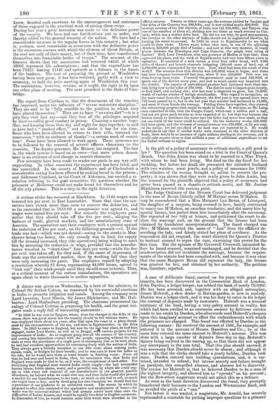A dinner was given on Wednesday, by a host of
his admirers, to Colonel Sir Arthur Cotton, so renowned by his successful exertions in India to promote irrigation and canals. Among the company were Lord Lyvedon, Lord Harris, Sir James Elphinstone, and Mr. Hali- burton ; Lord Shaftesbury presiding. The chairman pronounced the eulogy of Colonel Cottton in proposing his health, and the great irri- gator made a reply full of interesting statements :
"In 1828 he was sent to Tanjore, where, from the changes in the delta of the rivers, there was great alarm lest the country should be left without water. He Was employed there about ten years, after that upon the coast at a place threat. eyed by the encroachments of the sea, and then in Rajahmundry, on the delta there. In 1853 he came to England, but now for the laLt four years, he had been engaged, under Lord Harris, as well as in Bengal, wiffi various projects for the improvement of India. As an engineer going into all the corners of the country, and coming into immediate contact with the people, appearing without the least state or even the attendance of a single peon to accompany him as he went about, he had had excellent opportunities for conversing freely with the natives of India. They always gave a friendly reception to one who came about making tanks, canals, roads, or bridges for their benefit; and he was sure to have the ladies on his side, for he would save them so much trouble in fetching water. From all that he had seen and heard in India, then, his conclusion was, that India and England were made by God to be, as it were, the complement of each other. For everything that England most wanted India could supply—she bad unbounded human labour, fertile plains, water, and a powerful sun, by which she could sup- ply us with every raw material of our manufactures in the greatest possible abundance, far beyond what we could ever use, and then India would also present a market for our manufactures, in her turn ; as much as she had to sell, so much she might have to buy, and by developing her own resources we should find her a purchaser of our products to an unlimited extent. The means by which he proposed to effect this consisted of the application and employment of water—for water was the universal solvent which had already solved more than once the difficulties of Indian finance, and would be equally beneficial to English commerce. In illustration of this, he would mention some facts which were recorded in the official returns. Twenty or thirty years ago the revenue yielded by Tanjore and the delta of the Cauvery was 300,0001., and it now yielded nearly 600,0001. The average revenue of the 100 districts of India was but 250,0001., and Tanjore was one of the smallest of them all, yielding now ten times as much revenue as Cut.. tack, which was a similar delta land. He did not see why, by good management,, the revenue of the other districts of India should not be augmented likewise, by turning the water to account. In 1844 he went to Rajahmundry to see what could be done there. Eleven years before that date, in one of the adjoining districts, 250,000 people died of famine ; and now at this very moment, in many- places between the Himalayas and Cape Comorin, the people were dying of famine! Well, Lord Tweeddale, who was governor of Madras at that time, them approved his plans, and the work at Rajahmundry had now been fifteen years in operation. It consisted of a weir across a river four miles broad, with 1500 miles of channel and branch channels irrigating 700,00 acres of land, out of 1,100,000 acres commanded by the weir. Now, what had been the result of this work? The revenue from that district was 196,0001. when it began, and there had been a regular increase till last year, when it was 320,0001. This was not from levying more taxes. Formerly the government used to send 100,0001. of specie out of the district every year, and now so much specie was imported into the district. The exports of agricultural produce had Increased more than ten- fold, being now to the value of 390,0001. The district used to import grain largely, to feed itself, and nothing else ; now last year it imported no grain, but 70,0001. worth of various articles of foreign merchandise. With regard to navigation, on the main canal from the Upper Godavery, the first year it was opened there were 700 boats passed by it, but in the last year that number had increased to 13,000, and most of them doable the tonnage. Putting these facts together, they showed the astonishing progress that might be made in India. It was true, as Mr. Laing once remarked to him, that the Ganges Canal, which cost a million and a half, had not yet given such returns as were expected of it: but that was because the branch canals to distribute the water into the fields had never been made, so that not one-tenth of the water could be utilized. On the Godavery works 400,0001. had been spent, and the increase of annual revenue was 120,0001., or 35 per cent. on the outlay, yet not one-third of its laud was yet watered by it. He would undertake to say that if similar works were executed in the other districts of India, there would be an increase of eight millions sterling in the revenue, and it would only require three or four millions a year of additional expenditure to set the Indian revenue to rights.






























 Previous page
Previous page